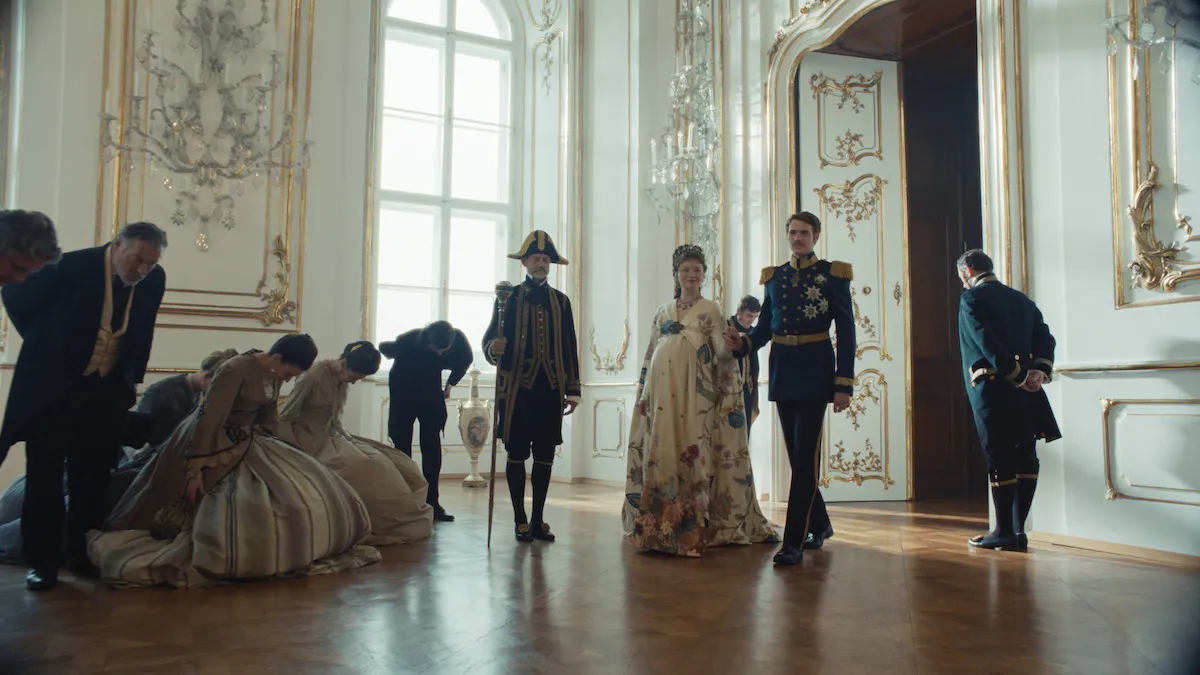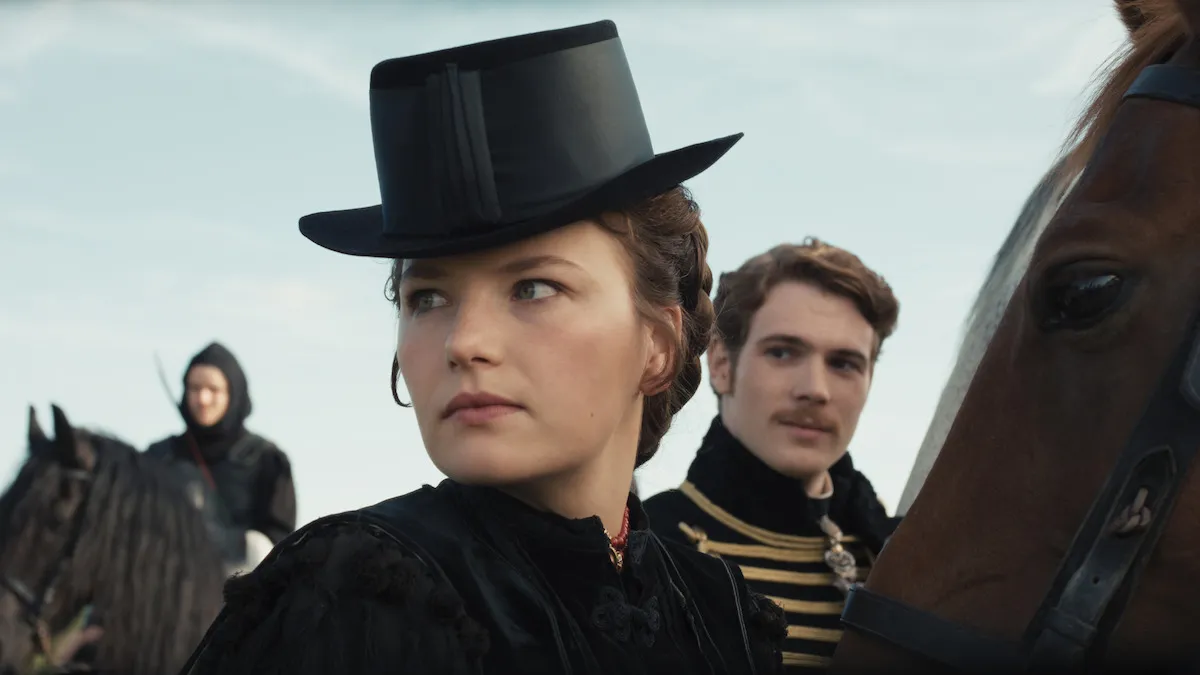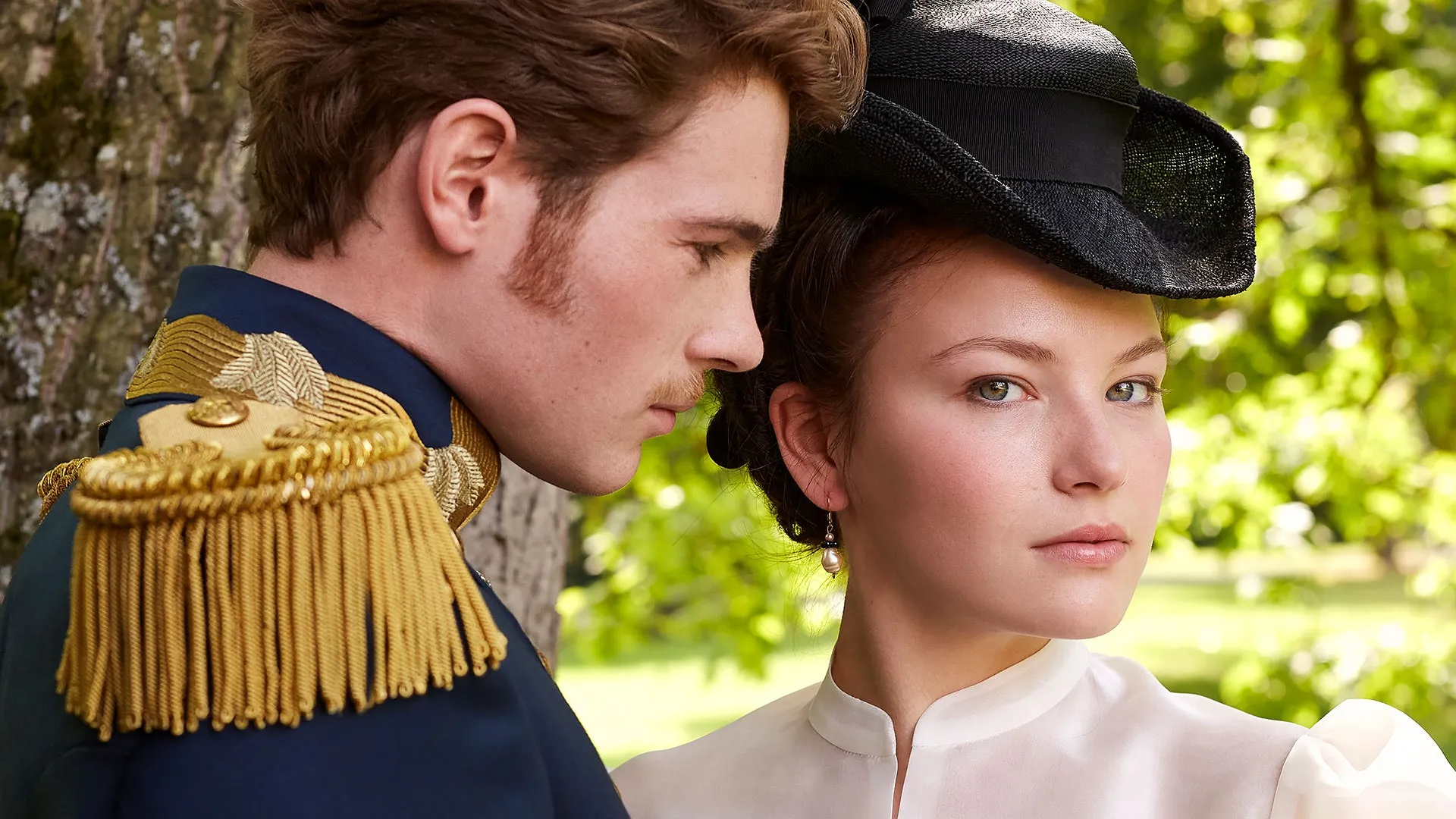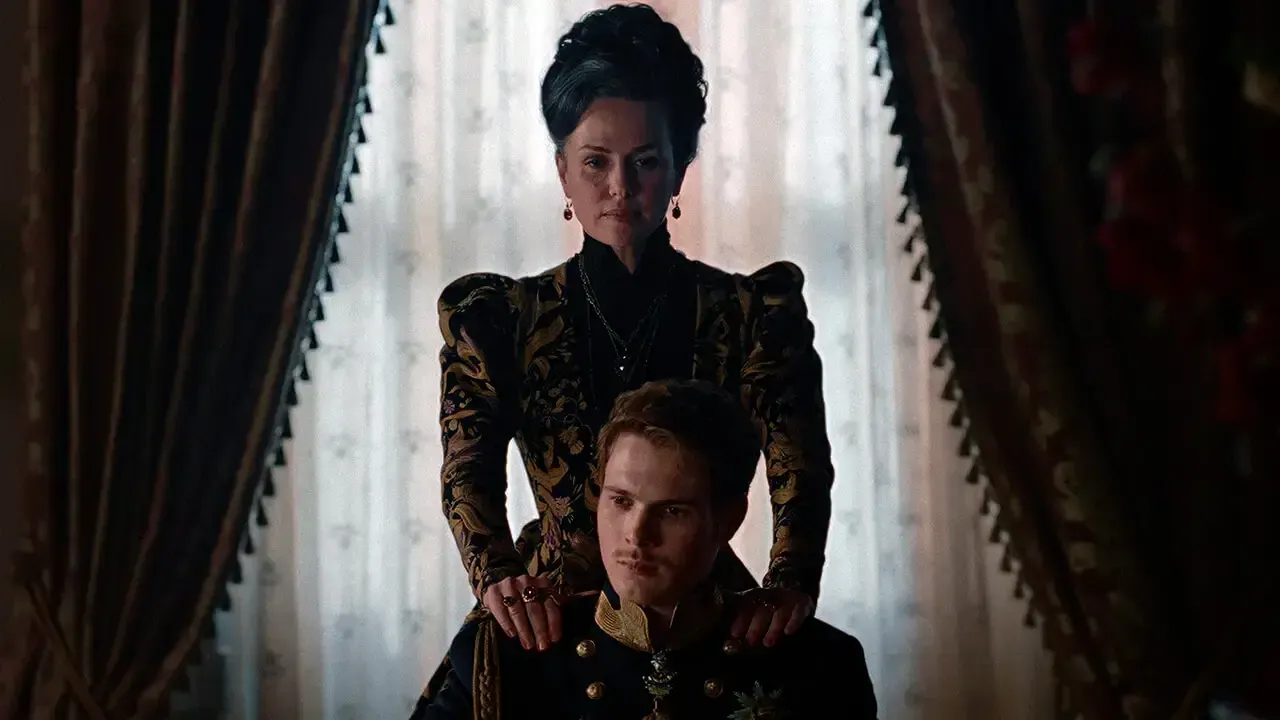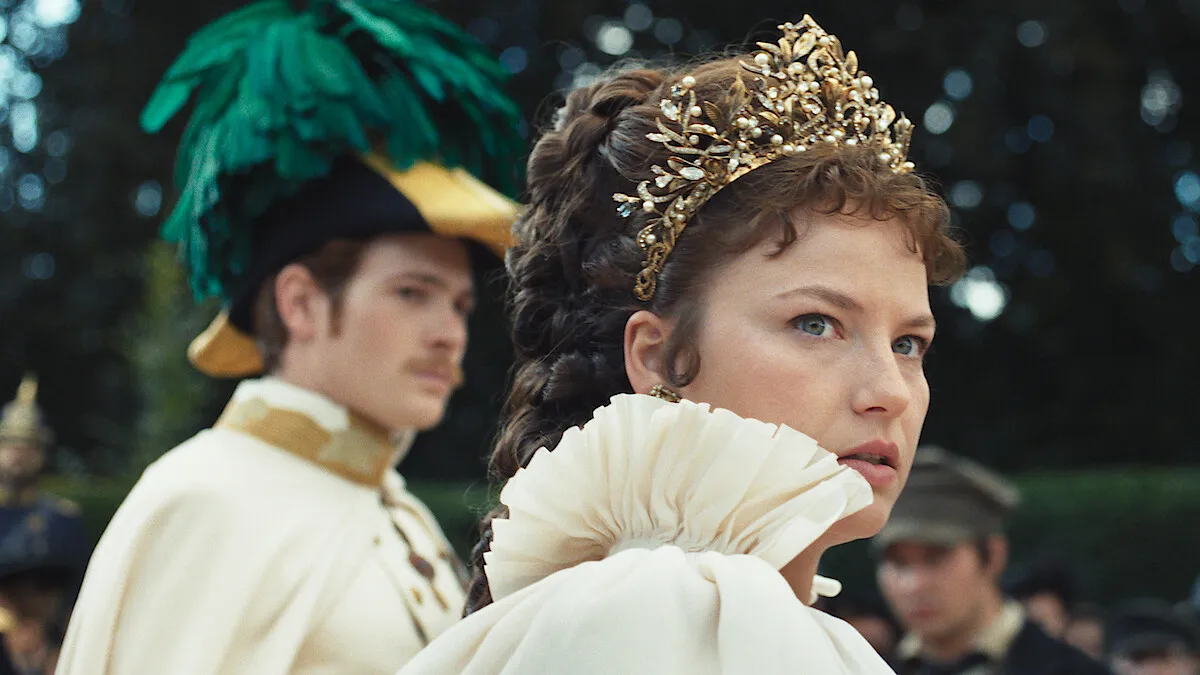The first season of “The Empress” wowed viewers with a passionate love story between Elisabeth von Wittelsbach and Emperor Franz Joseph, portraying their whirlwind courtship that violated royal customs. Their relationship, a rebellious and passionate connection, evolved into a sophisticated political collaboration after a personal journey.
Season 2 alters gears considerably, taking viewers to 1856 for a more mature and politically heated narrative. Elisabeth, now a mother with a young daughter and expecting her second child, navigates increasingly dangerous royal seas. The lighthearted romanticism of the first season gives way to severe political challenges, external threats, and internal family tensions.
The new season introduces viewers to a more nuanced Elisabeth, who is no longer just a young bride trying to find her place. Still, a strategic empress actively engaged in the Habsburg Empire’s complex political scene. Her relationship with Franz has matured into a collaboration characterized by mutual respect and shared challenges despite underlying romantic tensions.
Political upheaval in the Lombardy-Venetia area becomes a focal focus of the plot, with the possibility of rebellion endangering the imperial throne’s stability. Elisabeth’s sensitive disposition clashes with harsh political realities, creating dramatic moments that show her rising political understanding and humanitarian impulses.
The advent of her second child, another daughter, adds to the complication, as the royal court’s ardent desire for a male heir causes extra familial friction. Franz’s overbearing mother, Sophie, remains a strong enemy, manipulating events to secure the Habsburg heritage.
Season 2 promises a deeper, more sophisticated investigation of power, family, and personal autonomy within the limits of 19th-century imperial life. It will also feature heightened political intrigue, nuanced character development, and stunning historical visuals.
Crowns, Conflicts, and Conspiracies
The second season of “The Empress” transports viewers to a realm of royal tension and personal conflict based on Empress Elisabeth’s fragile position in the Habsburg Empire. Pregnant and under intense strain, Elisabeth faces the greatest royal challenge: producing a male heir to secure the dynasty’s destiny.
The political scene is rife with simmering unrest, exemplified by a horrific moment at a diplomatic banquet. Adolfo, a representative from Lombardy-Venetia, presents Elisabeth with a severed cow tongue as a powerful symbolic gesture demanding liberation from Habsburg authority. When he begs for his release before being tragically shot, Elisabeth breaches convention by rushing to his aid, demonstrating her sympathetic character that continuously challenges royal standards.
Emperor Franz Joseph found himself caught between rising political forces. The kingdom of Piedmont is aggressively striving to unify Italian-speaking territories against Austrian rule, endangering the empire’s stability. Franz is desperate for supporters and contemplates approaching Napoleon III, despite his mother Sophie’s deep misgivings about Napoleon’s legitimacy.
Archduke Maximilian is exiled on the outskirts of these enormous political operations. Deeply miserable and considering suicide, he is given an unexpected lifeline when Franz summons him to perhaps assist with diplomatic challenges. This surprise recall hints that Maximilian may play an important role in the empire’s survival.
Court intrigue simmers beneath the surface, with figures like Leontine navigating secret affairs and hidden intentions. Her secret relationship with the royal doctor complicates an already stressful royal setting.
When Elisabeth eventually delivers birth, the moment is filled with disappointment. The midwife’s forecast of a male successor fails, and Elisabeth has another daughter. Franz and Sophie’s apparent dissatisfaction exemplifies the constant anxiety surrounding royal succession.
The season expertly blends personal drama with political upheaval, demonstrating how individual decisions resonate throughout an empire. Elisabeth emerges as a multifaceted character: a mother, a political activist, and a woman who is challenging the harsh constraints of her day.
Royalty Unmasked: Characters in Constant Evolution
Elisabeth, a transformative personality who has significantly changed from a rebellious young bride to a strategically oriented royal, is at the heart of “The Empress.” She is no longer just challenging court traditions; she navigates imperial politics with subtle knowledge. Despite probable political dangers, her compassion remains her defining characteristic, as evidenced by her rush to help Adolfo, the dissident Lombardy-Venetia deputy.
Emperor Franz Joseph emerges as a confused leader, often between familial expectations and imperial duties. His relationship with Elisabeth has evolved from a passionate romance into a complex partnership. While they remain closely attached, they now work together as political allies to defend against external dangers and internal judicial maneuvers.
Archduchess Sophia is the season’s most formidable character, exuding pure evil energy. Her unwavering determination to protect Habsburg power makes her more terrifying than any external threat. She manipulates family relations with surgical precision, utilizing her power to coerce Franz into producing a male heir and directing court operations. Her treatment of her children, particularly her stern attitude toward Ludwig’s sexuality, demonstrates a relentless determination to uphold traditional royal norms.
Archduke Maximilian presents an intriguing storyline about redemption and ambition. Wallowing in exile and suffering from depression, he represents the forgotten royal, desperate to show his worth. His suicidal thoughts and the subsequent telegram from Franz reveal a possible way to redemption, implying future political intrigue.
The relationships between the characters create a delicate power environment in which personal wants clash with imperial expectations. Elisabeth’s disobedience of traditional standards, Franz’s diplomatic challenges, Sophia’s manipulative control, and Maximilian’s yearning for relevance all contribute to a complex narrative beyond typical historical drama stereotypes.
Each character is substantially influenced by the suffocating limitations of royal life, with their particular conflicts echoing larger themes of human liberties vs institutional authority. The end effect is a deep, multidimensional examination of human complexity within the gilded cage of imperial Austria.
Crowns, Constraints, and Consequences
The second season of “The Empress” goes into the claustrophobic world of royal expectations, where human wants clash with institutional needs. Motherhood emerges as a terrible war, with Elisabeth caught in a never-ending cycle of reproductive pressure. The royal family’s single concentration on producing a male heir lowers her to a biological vessel, transforming her most intimate experience into a political performance.
Political turmoil simmers beneath the surface, as seen by the startling moment in which Adolfo presents a severed cow tongue at a diplomatic event. This visceral deed exemplifies the burgeoning nationalist movements challenging Habsburg rule. The Lombardy-Venetia area is a microcosm of bigger revolutionary conflicts as human tales collide with larger political developments.
The tension between personal freedom and royal duty generates a steady, dramatic pulse. Once a feisty young newlywed, Elisabeth is now navigating a complicated environment of compromise and resistance. Her humanitarian attitude consistently challenges rigorous imperial conventions, whether running to Adolfo’s rescue or fighting for diplomatic delicacy.
Family dynamics show a more dangerous battleground than any external fight. Archduchess Sophie emerges as a brilliant manipulator using familial connections like strategic weapons. Her treatment of her children, notably her severe assessment of Ludwig’s sexuality, exemplifies how personal identification can become a war for preserving traditional power structures.
Trust becomes a valuable and delicate asset. Characters like Leontine juggle secret affairs and hidden objectives, demonstrating how carefully created appearances are frequently necessary for personal survival. The royal court evolves into a complex ecosystem in which devotion is both a weapon and a vulnerability.
Finally, the season examines how institutional power compresses and transforms people’s lives. Each character fights to retain their humanity in a system designed to squash individual individuality, making “The Empress” a profound meditation on personal agency in a world of predetermined expectations.
Staging Imperial Grandeur
“The Empress” transforms historical drama into a visual feast, lovingly constructing the Habsburg world with amazing attention to detail. The clothing design takes on its own character, with opulent ball gowns and detailed military outfits that tell volumes about social structure and personal status. Each fabric choice feels deliberate, from Elisabeth’s delicate pregnant dresses to Sophie’s stiff, authoritarian costumes that telegraph power with each stitch.
The cinematography conveys the sumptuous but oppressive aspect of royal existence. The scenes change between the palace’s cramped inner quarters, with ornate walls and heavy, watching paintings, and the vast, possibly revolutionary landscapes of Lombardy-Venetia. Soft, diffused lighting in intimate times contrasts dramatically with harsh, clinical illumination in political clashes, creating visual analogies for the characters’ inner landscapes.
While historical authenticity underpins the production, the artists recognize that visual narrative goes beyond duplication. The set designs do more than just recreate 1856; they also bring to life a world fraught with political and personal tensions. Every frame feels like a meticulously crafted artwork, with even the smallest background detail contributing to the narrative’s emotional richness.
Using period-appropriate instrumentation, the soundtrack gently reinforces the narrative’s emotional journey by emphasizing the characters’ internal conflicts. Musical motifs serve as language bridges between personal drama and larger historical processes, transforming sound into an additional layer of narration.
“The Empress” lifts itself from a simple period drama to a rich, immersive historical experience by emphasizing visual and auditory authenticity.
Blending Fact and Fiction
“The Empress” distinguishes between historical data and theatrical storytelling, transforming the rigorous world of 19th-century Habsburg politics into a gripping narrative. While the series is anchored in true historical times, such as rising tensions in Lombardy-Venetia and complicated diplomatic interactions with France, it refuses to be confined by exact historical verification.
Elisabeth emerges as a brilliant combination of verifiable history and imaginative interpretation. Her character goes beyond traditional royal narratives, depicting a lady who is both a product of her period and remarkably ahead of it. The show strategically probes her inner world, envisioning her emotional environment beyond the limited historical data.
Diplomatic engagements, particularly those involving Napoleon III and the larger European political environment, retain a sense of historical authenticity. However, the authors aren’t hesitant to add dramatic tension, transforming potentially dull historical periods into heart-pounding passages that show deeper human impulses.
The genius of “The Empress” is its capacity to make history feel alive and breathe. By emphasizing emotional reality over sheer factual reproduction, the series encourages viewers to see historical figures as complex, nuanced humans rather than distant marble statues.
Royal Horizons: Where Drama Meets History
Season 2 of “The Empress” transforms from a passionate romance to a nuanced political drama, portraying the complexities of imperial life. The series effectively transcends traditional period storytelling, offering characters who are both products of their moment in history and eternal human beings battling with universal challenges.
Elisabeth’s journey is the season’s most interesting narrative arc. She transforms from a rebellious young bride to a politically smart empress, navigating impossible expectations with incredible tenacity. Her challenges highlight greater themes of personal agency amid restrictive institutional frameworks, making her story globally relatable.
The show’s greatest merit is its subtle approach to historical storytelling. Humanizing historical people crosses the gap between the distant past and modern emotional experiences. Political conflicts, family dynamics, and personal sacrifices combine to form a complex, absorbing narrative that feels historically accurate and startlingly present.
For those seeking more than costume theater spectacle, “The Empress” is a profound investigation of power, identity, and resistance. It’s a must-see for anyone captivated by the complex dance of personal ambitions and institutional limits.
As the season comes to a close, one burning question remains: how will Elisabeth and Franz deal with the rising political and emotional challenges that lie ahead? The stage is set for a more captivating third season.
The Review
The Empress Season 2
The second season of "The Empress" emerges as a sophisticated departure from the first, trading in pure romantic spectacle for deeper political intrigue and subtle character development. The series defies traditional period drama tropes by highlighting the human weaknesses hidden beneath royal facades. The narrative is anchored by Elisabeth's transformation from a rebellious bride to a strategically oriented empress, and the show's superb production design and nuanced performances elevate it above mere historical reenactment. The season skillfully mixes personal drama with larger political conflicts, delving into how human actions affect imperial structures. Its strength is that it humanizes historical individuals, making their hardships appear present and real, even though they take place in the nineteenth century.
PROS
- Exceptional character development
- Stunning costume and set design
- Nuanced portrayal of historical figures
- Complex political narrative
- Strong performances, especially by lead actors
- Sophisticated exploration of gender dynamics
CONS
- Occasional historical inaccuracies
- Some pacing inconsistencies
- Potential overemphasis on dramatic elements









































